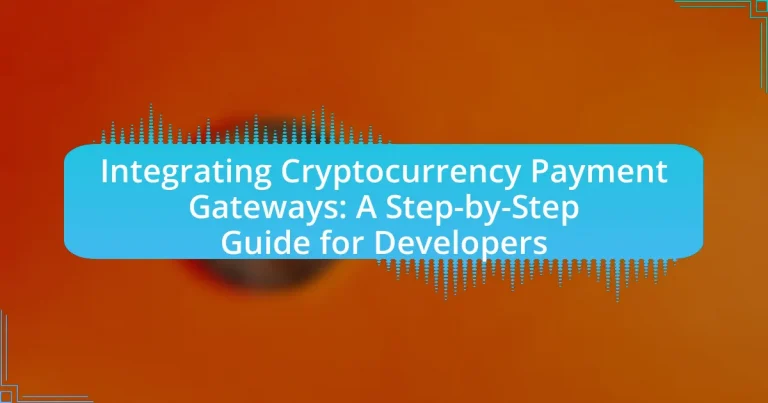Cryptocurrency payment gateways are essential platforms that enable merchants to accept cryptocurrency payments for goods and services, facilitating transactions through various digital currencies. This article provides a comprehensive guide for developers on integrating these gateways, detailing their functionality, the technologies involved, and the advantages they offer, such as lower transaction fees and enhanced security. It outlines the integration process, including selecting a payment gateway, setting up API connections, and ensuring compliance with regulations. Additionally, the article addresses common challenges developers may face during integration and offers best practices for optimizing user experience and transaction security.

What are Cryptocurrency Payment Gateways?
Cryptocurrency payment gateways are platforms that facilitate the acceptance of cryptocurrency payments for goods and services. These gateways enable merchants to process transactions in various cryptocurrencies, converting them into fiat currency or allowing them to retain the digital assets. For instance, companies like BitPay and CoinGate provide services that simplify the integration of cryptocurrency payments into e-commerce websites, ensuring secure and efficient transactions. The use of cryptocurrency payment gateways has grown significantly, with a report from Statista indicating that the global cryptocurrency market size was valued at over $1.5 trillion in 2021, highlighting the increasing adoption of digital currencies in commerce.
How do Cryptocurrency Payment Gateways function?
Cryptocurrency payment gateways function by facilitating transactions between merchants and customers using digital currencies. These gateways act as intermediaries that convert cryptocurrency payments into fiat currency or directly process the digital currency, ensuring secure and efficient transactions. They utilize blockchain technology to verify and record transactions, providing transparency and security. For instance, when a customer makes a purchase using cryptocurrency, the payment gateway processes the transaction by checking the blockchain for sufficient funds and confirming the transaction before notifying the merchant. This process typically involves a small transaction fee, which varies by gateway, and ensures that both parties receive confirmation of the transaction’s completion.
What technologies are involved in Cryptocurrency Payment Gateways?
Cryptocurrency payment gateways utilize several key technologies, including blockchain technology, smart contracts, APIs, and cryptographic security protocols. Blockchain technology serves as the foundational ledger for recording transactions securely and transparently. Smart contracts automate and enforce agreements between parties without intermediaries, enhancing efficiency. APIs facilitate communication between the payment gateway and merchant platforms, allowing for seamless integration. Cryptographic security protocols ensure the protection of sensitive data and transactions, maintaining user privacy and preventing fraud. These technologies collectively enable the functionality and reliability of cryptocurrency payment gateways.
How do these technologies ensure transaction security?
Cryptocurrency payment gateways ensure transaction security through advanced cryptographic techniques and decentralized ledger technology. These systems utilize public and private key encryption to secure transactions, ensuring that only authorized users can initiate transfers. Additionally, blockchain technology records all transactions in a tamper-proof manner, making it nearly impossible for malicious actors to alter transaction data. The decentralized nature of blockchain further enhances security by eliminating single points of failure, as data is distributed across multiple nodes. This combination of encryption and decentralized verification processes significantly reduces the risk of fraud and unauthorized access, thereby ensuring the integrity and security of transactions.
What are the advantages of using Cryptocurrency Payment Gateways?
Cryptocurrency payment gateways offer several advantages, including lower transaction fees, faster processing times, and enhanced security. Lower transaction fees are often a result of reduced intermediary costs, as cryptocurrencies bypass traditional banking systems. Faster processing times occur because cryptocurrency transactions can be completed in minutes, unlike traditional bank transfers that may take days. Enhanced security is provided through blockchain technology, which ensures that transactions are encrypted and immutable, reducing the risk of fraud. These benefits make cryptocurrency payment gateways an attractive option for businesses looking to streamline their payment processes.
How do they enhance transaction speed compared to traditional methods?
Cryptocurrency payment gateways enhance transaction speed compared to traditional methods by utilizing blockchain technology, which allows for near-instantaneous processing of transactions. Unlike traditional banking systems that may take several days to clear transactions due to intermediaries and regulatory checks, cryptocurrency transactions can be confirmed within minutes or even seconds, depending on the network congestion and the cryptocurrency used. For example, Bitcoin transactions typically take about 10 minutes for confirmation, while transactions using cryptocurrencies like Ripple can be completed in just a few seconds. This significant reduction in processing time is primarily due to the decentralized nature of blockchain, which eliminates the need for intermediaries and streamlines the verification process.
What cost benefits do they provide for businesses?
Cryptocurrency payment gateways provide significant cost benefits for businesses by reducing transaction fees compared to traditional payment methods. Businesses can save up to 2-5% on transaction costs, as cryptocurrency transactions often have lower fees due to the absence of intermediaries like banks. Additionally, these gateways facilitate faster cross-border transactions, minimizing currency conversion costs and delays associated with international payments. According to a study by the Cambridge Centre for Alternative Finance, businesses adopting cryptocurrency payment systems can experience a reduction in overall payment processing costs, enhancing their profit margins.

How can developers integrate Cryptocurrency Payment Gateways?
Developers can integrate cryptocurrency payment gateways by utilizing APIs provided by payment gateway services. These APIs allow developers to connect their applications to the payment processing system, enabling transactions in various cryptocurrencies. For instance, popular gateways like Coinbase Commerce and BitPay offer comprehensive documentation and SDKs that facilitate integration. According to a report by Statista, the global cryptocurrency market is expected to reach a valuation of over $1 trillion, highlighting the growing demand for such integrations. By following the guidelines and utilizing the tools provided by these services, developers can effectively implement cryptocurrency payment solutions in their applications.
What are the initial steps for integrating a Cryptocurrency Payment Gateway?
The initial steps for integrating a Cryptocurrency Payment Gateway include selecting a suitable payment gateway provider, creating an account with that provider, and obtaining the necessary API keys. Selecting a provider involves evaluating options based on transaction fees, supported cryptocurrencies, and security features. After choosing a provider, developers must create an account to access the gateway’s services and documentation. Finally, obtaining API keys is essential for establishing a secure connection between the website or application and the payment gateway, enabling transaction processing.
What prerequisites should developers have before starting integration?
Developers should have a solid understanding of blockchain technology and cryptocurrency fundamentals before starting integration. This knowledge is crucial as it enables developers to comprehend how transactions are processed, the significance of wallets, and the role of smart contracts. Additionally, familiarity with APIs and SDKs specific to the cryptocurrency payment gateway is essential, as these tools facilitate the integration process. Understanding security protocols and best practices for handling sensitive financial data is also vital to ensure the integrity and safety of transactions.
How do developers choose the right payment gateway for their needs?
Developers choose the right payment gateway by evaluating factors such as transaction fees, supported currencies, integration ease, security features, and customer support. For instance, transaction fees can significantly impact profitability; a gateway with lower fees may be more appealing for high-volume transactions. Supported currencies are crucial, especially for cryptocurrency transactions, as developers need to ensure the gateway accommodates the specific digital currencies they plan to accept. Integration ease is also vital; a gateway that offers comprehensive APIs and documentation can streamline the development process. Security features, including fraud detection and compliance with regulations, are essential to protect both the developer and the end-user. Lastly, reliable customer support can assist developers in resolving issues quickly, ensuring a smoother operation.
What are the key integration processes for developers?
The key integration processes for developers when integrating cryptocurrency payment gateways include selecting the appropriate payment gateway, setting up API credentials, implementing the payment processing logic, handling callbacks and notifications, and ensuring compliance with regulatory standards. Developers must first choose a gateway that aligns with their project requirements, such as Coinbase, BitPay, or Stripe. After selection, they need to create an account and obtain API keys for authentication. Next, developers implement the payment processing logic by integrating the gateway’s API into their application, which involves coding the necessary functions to initiate transactions. Handling callbacks and notifications is crucial for confirming transaction statuses and updating the application accordingly. Finally, developers must ensure compliance with regulations, such as KYC (Know Your Customer) and AML (Anti-Money Laundering) laws, to operate legally within their jurisdiction.
How do developers set up API connections with the payment gateway?
Developers set up API connections with payment gateways by following the documentation provided by the gateway service, which typically includes obtaining API keys, configuring endpoints, and implementing authentication methods. This process involves registering for an account with the payment gateway, generating the necessary API credentials, and integrating the provided SDK or libraries into their application. For example, many payment gateways require developers to use HTTPS for secure communication and may provide sample code to facilitate integration. The accuracy of this process is supported by the fact that most payment gateways, such as Stripe and PayPal, offer comprehensive guides and developer resources to ensure proper setup and security compliance.
What coding languages and frameworks are commonly used for integration?
Commonly used coding languages for integration include JavaScript, Python, Java, and PHP, while popular frameworks are Node.js, Django, Spring, and Laravel. JavaScript is widely utilized for client-side integration, enabling dynamic web applications. Python, known for its simplicity, is often used in backend services and APIs. Java is favored for enterprise-level applications, providing robust integration capabilities. PHP is frequently employed for server-side scripting, particularly in web development. Frameworks like Node.js facilitate asynchronous event-driven programming, Django offers a high-level Python framework for rapid development, Spring provides a comprehensive framework for Java applications, and Laravel simplifies PHP development with elegant syntax. These languages and frameworks are chosen for their efficiency, community support, and compatibility with various APIs and services.

What challenges might developers face during integration?
Developers may face several challenges during the integration of cryptocurrency payment gateways, including technical complexity, regulatory compliance, and security concerns. Technical complexity arises from the need to understand blockchain technology, smart contracts, and the specific APIs of different payment gateways, which can vary significantly. Regulatory compliance is critical, as developers must navigate varying laws and regulations regarding cryptocurrency transactions in different jurisdictions, which can lead to legal complications if not properly addressed. Security concerns are paramount, as integrating payment gateways involves handling sensitive financial data, making systems vulnerable to hacking and fraud. According to a report by the International Journal of Information Management, 60% of businesses reported security breaches related to payment processing, highlighting the importance of robust security measures during integration.
How can developers troubleshoot common integration issues?
Developers can troubleshoot common integration issues by systematically identifying and resolving errors in the integration process. This involves checking API documentation for correct endpoint usage, validating API keys and credentials, and ensuring that data formats match the expected specifications. Additionally, developers should utilize logging to capture error messages and responses from the payment gateway, which can provide insights into what went wrong. Testing in a sandbox environment can also help isolate issues without affecting live transactions. According to a study by the International Journal of Information Management, effective error logging and testing practices significantly reduce integration failure rates, demonstrating the importance of these troubleshooting methods.
What are the most frequent errors encountered during integration?
The most frequent errors encountered during integration of cryptocurrency payment gateways include incorrect API key usage, failure to handle transaction confirmations, and inadequate error handling. Incorrect API key usage often leads to authentication failures, preventing successful transactions. Failure to handle transaction confirmations can result in lost payments or double spending, as developers may not properly verify the status of a transaction on the blockchain. Inadequate error handling can cause the application to crash or behave unpredictably when unexpected issues arise, leading to a poor user experience. These errors are commonly reported in developer forums and integration documentation, highlighting their prevalence in real-world applications.
How can developers ensure compliance with regulations?
Developers can ensure compliance with regulations by conducting thorough research on applicable laws and guidelines related to cryptocurrency transactions. This includes understanding anti-money laundering (AML) and know your customer (KYC) requirements, which are mandated by regulatory bodies in various jurisdictions. For instance, the Financial Action Task Force (FATF) provides guidelines that many countries adopt, emphasizing the need for businesses to implement robust verification processes for users. Additionally, developers should integrate compliance checks into their payment gateway systems, ensuring that transactions are monitored and reported as required by law. Regular audits and updates to the system in response to changing regulations further reinforce compliance efforts.
What best practices should developers follow when integrating Cryptocurrency Payment Gateways?
Developers should prioritize security, user experience, and compliance when integrating cryptocurrency payment gateways. Implementing robust security measures, such as SSL encryption and two-factor authentication, protects sensitive data and reduces the risk of fraud. Ensuring a seamless user experience involves simplifying the payment process and providing clear instructions, which can enhance customer satisfaction and conversion rates. Additionally, adhering to regulatory requirements, such as KYC (Know Your Customer) and AML (Anti-Money Laundering) guidelines, is crucial for legal compliance and maintaining the integrity of the payment system. These practices are supported by industry standards and guidelines from organizations like the Financial Action Task Force (FATF) and the International Organization for Standardization (ISO).
How can developers optimize the user experience during payment processing?
Developers can optimize the user experience during payment processing by implementing a streamlined and intuitive interface that minimizes friction. This includes reducing the number of steps required to complete a transaction, providing clear instructions, and ensuring that the payment process is mobile-friendly. Research indicates that a simplified checkout process can increase conversion rates by up to 35%, as users are less likely to abandon their carts when faced with fewer obstacles. Additionally, integrating real-time feedback mechanisms, such as progress indicators and error messages, enhances user confidence and satisfaction during the transaction.
What security measures should be implemented to protect transactions?
To protect transactions, implement encryption, multi-factor authentication, and regular security audits. Encryption secures data during transmission, making it unreadable to unauthorized parties. Multi-factor authentication adds an extra layer of security by requiring users to verify their identity through multiple methods, reducing the risk of unauthorized access. Regular security audits identify vulnerabilities and ensure compliance with security standards, thereby enhancing the overall security posture of the transaction system. These measures collectively mitigate risks associated with fraud and data breaches in cryptocurrency transactions.
What resources are available for developers integrating Cryptocurrency Payment Gateways?
Developers integrating cryptocurrency payment gateways can access a variety of resources including official documentation from payment gateway providers, software development kits (SDKs), and community forums. Official documentation, such as that from Coinbase Commerce or BitPay, provides detailed guidelines on API usage, integration steps, and best practices. SDKs, available in multiple programming languages, facilitate easier integration by providing pre-built functions and methods. Community forums like Stack Overflow and GitHub offer platforms for developers to ask questions, share experiences, and find solutions to common issues. These resources collectively enhance the integration process by providing essential technical support and community engagement.
Where can developers find documentation and support for specific gateways?
Developers can find documentation and support for specific cryptocurrency payment gateways on the official websites of those gateways. Each gateway typically provides comprehensive resources, including API documentation, integration guides, and support forums. For example, popular gateways like Coinbase Commerce and BitPay offer detailed documentation sections that outline setup procedures, code examples, and troubleshooting tips, ensuring developers have access to the necessary information for successful integration.
What online communities can provide assistance and share experiences?
Online communities that provide assistance and share experiences related to integrating cryptocurrency payment gateways include Reddit, specifically the r/CryptoCurrency and r/Bitcoin subreddits, as well as specialized forums like BitcoinTalk and Stack Exchange’s Bitcoin section. These platforms host discussions, tutorials, and user experiences that can help developers navigate the complexities of cryptocurrency integration. For instance, Reddit has over 3 million members in r/CryptoCurrency, facilitating a wealth of shared knowledge and support.
















